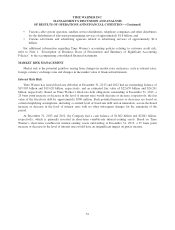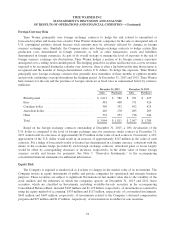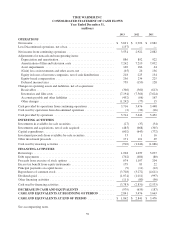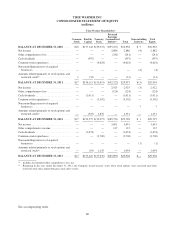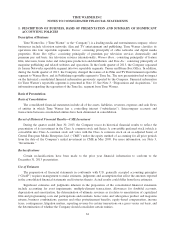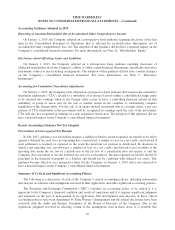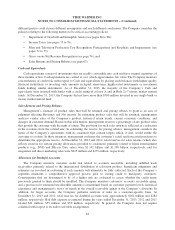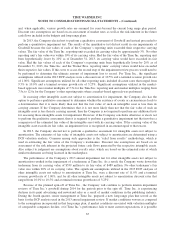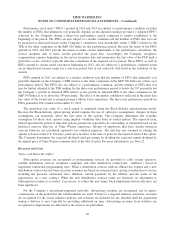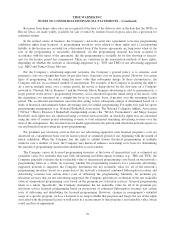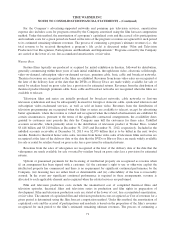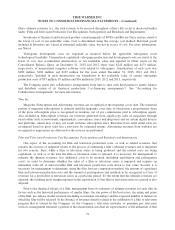Time Magazine 2013 Annual Report Download - page 78
Download and view the complete annual report
Please find page 78 of the 2013 Time Magazine annual report below. You can navigate through the pages in the report by either clicking on the pages listed below, or by using the keyword search tool below to find specific information within the annual report.TIME WARNER INC.
NOTES TO CONSOLIDATED FINANCIAL STATEMENTS – (Continued)
Accounting Guidance Adopted in 2013
Reporting of Amounts Reclassified Out of Accumulated Other Comprehensive Income
On January 1, 2013, the Company adopted on a retrospective basis guidance requiring disclosure of the line
item in the Consolidated Statement of Operations that is affected by reclassification adjustments out of
Accumulated other comprehensive loss, net. The adoption of this guidance did not have a material impact on the
Company’s consolidated financial statements. For more information, see Note 10, “Shareholders’ Equity.”
Disclosures about Offsetting Assets and Liabilities
On January 1, 2013, the Company adopted on a retrospective basis guidance requiring disclosure of
additional information about the Company’s ability to offset certain financial instruments, specifically derivative
instruments subject to master netting arrangements. The adoption of this guidance did not have a material impact
on the Company’s consolidated financial statements. For more information, see Note 7, “Derivative
Instruments.”
Accounting for Cumulative Translation Adjustments
On January 1, 2013, the Company early adopted on a prospective basis guidance that requires the cumulative
translation adjustment (“CTA”) related to a subsidiary of or group of assets within a consolidated foreign entity
to be released into earnings when (i) the foreign entity ceases to have a controlling financial interest in that
subsidiary or group of assets and (ii) the sale or transfer results in the complete or substantially complete
liquidation of the foreign entity. For the sale of an equity method investment that is a foreign entity, a pro rata
portion of CTA attributable to the investment will be recognized in earnings upon the sale of the investment.
CTA will also be recognized in earnings in a step acquisition transaction. The adoption of this guidance did not
have a material impact on the Company’s consolidated financial statements.
Recent Accounting Guidance Not Yet Adopted
Presentation of Unrecognized Tax Benefits
In July 2013, guidance was issued that requires a liability related to an unrecognized tax benefit to be offset
against a deferred tax asset for a net operating loss carryforward, a similar tax loss or a tax credit carryforward if
such settlement is required or expected in the event the uncertain tax position is disallowed. In situations in
which a net operating loss carryforward, a similar tax loss or a tax credit carryforward is not available at the
reporting date under the tax law of a jurisdiction or the tax law of a jurisdiction does not require it, and the
Company does not intend to use the deferred tax asset for such purpose, the unrecognized tax benefit should be
presented in the financial statements as a liability and should not be combined with deferred tax assets. This
guidance became effective on a prospective basis for the Company on January 1, 2014 and is not expected to
have a material impact on the Company’s consolidated financial statements.
Summary of Critical and Significant Accounting Policies
The following is a discussion of each of the Company’s critical accounting policies, including information
and analysis of estimates and assumptions involved in their application, and other significant accounting policies.
The Securities and Exchange Commission (“SEC”) considers an accounting policy to be critical if it is
important to the Company’s financial condition and results of operations and if it requires significant judgment
and estimates on the part of management in its application. The development and selection of these critical
accounting policies have been determined by Time Warner’s management and the related disclosures have been
reviewed with the Audit and Finance Committee of the Board of Directors of the Company. Due to the
significant judgment involved in selecting certain of the assumptions used in these areas, it is possible that
62


